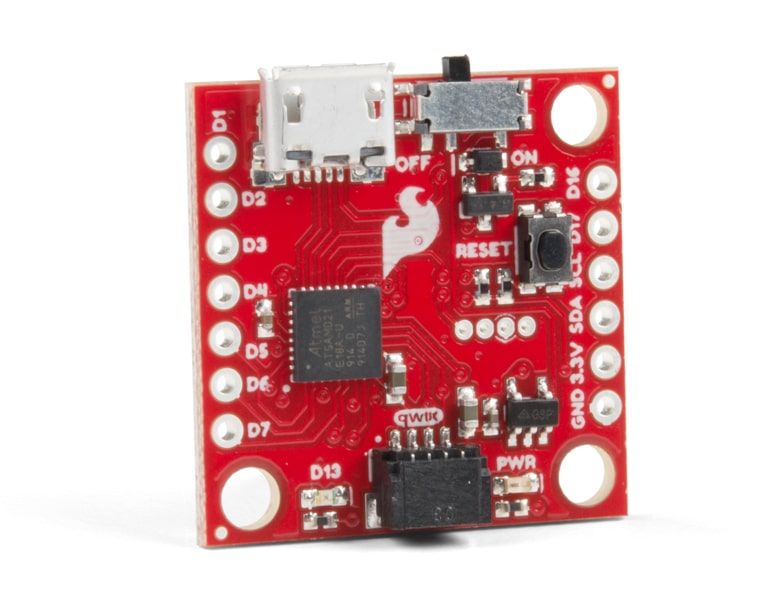
Qwiic Micro with Flash by SparkFun
The SparkFun Qwiic Micro is an 1 x 1 inch microcontroller made for the Qwiic Eco-system. It’s SparkFun’s smallest microcontroller to date that’s made for integrating into small projects. Onboard is the Atmel ATSAMD21E18 32-bit ARM Cortex-M0+ processor with 256KB flash, 32KB SRAM, and an operating speed of up to 48MHz.
- 13 GPIO Pins - The SparkFun Qwiic Micro still has 13 GPIO pins, 5 of which are analog.
- UF2 Bootloader - The SparkFun Qwiic Micro comes with the UF2 Bootloader which does not require the board to have drivers installed on modern operating systems. It also allows for easy drag and drop programming.
- SWD Programming Header - On board is a four pin header for reprogramming the microcontroller for advanced users who want to modify the chip to their liking.
- Optional Circuitry - There are pads for an extra flash memory chip in an SOIC 8-Pin Package. Check out SparkFun’s site for the specific chip used for the circuity python build that includes this chip!
Purchase
Contribute
Have some info to add for this board? Edit the source for this page here.
CircuitPython 9.2.8
This is the latest stable release of CircuitPython that will work with the Qwiic Micro with Flash. Use this release if you are new to CircuitPython.
Modules included in this download
analogio array board builtins busio busio.SPI busio.UART collections digitalio math microcontroller neopixel_write nvm onewireio os pwmio rainbowio random rotaryio rtc storage struct supervisor sys time touchio usb_cdc usb_hid usb_midiFeatures: STEMMA QT/QWIIC, Breadboard-Friendly
CircuitPython 10.0.0-alpha.8
This is the latest development release of CircuitPython that will work with the Qwiic Micro with Flash.
Alpha development releases are early releases. They are unfinished, are likely to have bugs, and the features they provide may change. Beta releases may have some bugs and unfinished features, but should be suitable for many uses. A Release Candidate (rc) release is considered done and will become the next stable release, assuming no further issues are found.
Please try alpha, beta, and rc releases if you are able. Your testing is invaluable: it helps us uncover and find issues quickly.
Release Notes for 10.0.0-alpha.8
Modules included in this download
analogio array board builtins busio busio.SPI busio.UART collections digitalio math microcontroller neopixel_write nvm onewireio os pwmio rainbowio random rotaryio rtc storage struct supervisor sys time touchio usb_cdc usb_hid usb_midiFeatures: STEMMA QT/QWIIC, Breadboard-Friendly
Absolute Newest
Every time we commit new code to CircuitPython we automatically build binaries for each board and language. The binaries are stored on Amazon S3, organized by board, and then by language. These releases are even newer than the development release listed above. Try them if you want the absolute latest and are feeling daring or want to see if a problem has been fixed.
Previous Versions of CircuitPython
All previous releases of CircuitPython are available for download from Amazon S3 through the button below. For very old releases, look in the OLD/ folder for each board. Release notes for each release are available at GitHub button below.
Older releases are useful for testing if you something appears to be broken in a newer release but used to work, or if you have older code that depends on features only available in an older release. Otherwise we recommend using the latest stable release.
